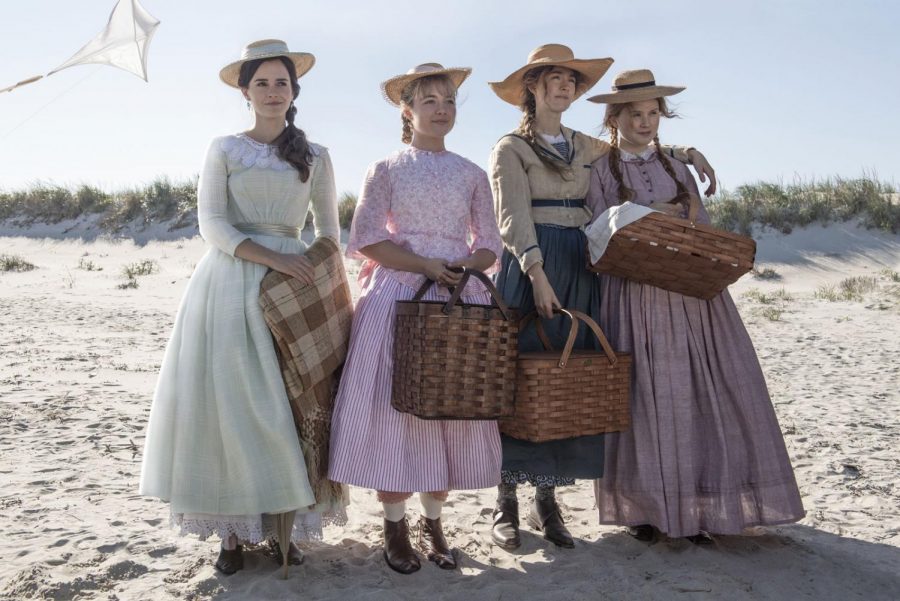“Little Women” makes a big impact
Gerwig’s 2019 re-imagining becomes a smashing success
The March sisters stand together on a beach. Actors Emma Watson, Florence Pugh, Saoirse Ronan, and Eliza Scanlen are pictured. Photo obtained via Sony Pictures and Columbia Picture.
January 12, 2020
It’s a familiar coming-of-age story about four sisters during Civil War-era America. As they grow up, they fight, laugh, and cry together through difficulties both large and small. With the friendship of their young neighbor Mr. Laurence (or Laurie), the Little Women develop learn lessons about family and love in a heart-warming way. Louisa May Alcott’s 1868 novel is a classic that will make you laugh, cry, swoon- quite possibly all at the same time.
Though Alcott’s Little Women narrative has experienced more than a few adaptations, Greta Gerwig’s 2019 revisioning brings something fresh and distinctly different than its predecessors, and these qualities have enabled a well-worn story to gain significant traction. With two Golden Globe nominations and around 80.4 million dollars in the box office so far, the movie is expected to only grow in its impact, particularly if it picks up any Oscar nominations.
The most unique aspect of this adaptation its refreshingly different timeline. Diverging from a chronological storyline, Gerwig’s plot weaves in and out of different periods of the March sisters’ lives. Beginning and ending with an adult Jo, looking to publish a semi-autobiographical novel “Little Women,” the movie shifts periodically between this perspective and her childhood until all the plot points line up. Not only did this technique craft a more complex, compelling narrative, but at times the clever shifts provided moments of comedy or evoked a more tender sadness.
With a star-studded cast, Gerwig’s film was almost sure to be a hit. Emma Watson as the oldest sister Meg brought a new complexity and endearing warmth to the character. Saoirse Ronan played the tomboy Jo, every moment of her performance stirring and thoroughly enjoyable as her brash, young self contrasted with her time-hardened adult self. Florence Pugh somehow turned the vain, dislikable Amy into an oddly relatable and lovable character, and Eliza Scanlen embodied all things sweet with a beautiful performance as Beth. Last but not least, Timothee Chalamet held his own as one of the only male figures in the story. He was simultaneously charming, emotive, and confusing – in the best way possible. Together, along with Laura Dern and Meryl Streep, an energetic, almost electric family dynamic emerged, characterized by jumbled dialogue and sisterly shenanigans.
Not only has Gerwig’s Little Women garnered praise for its innovative timeline, near-perfect casting, and carefully crafted aesthetics, but the public has been quick to applaud its tackling of social issues, most particularly gender discrimination, without losing any of the warmth and lightness of Alcott’s original novel.
In this movie, Jo tackles obstacles to female authorship, overcomes traditional social expectations, and embodies many feminist ideals. However, this isn’t the only perspective presented. Gerwig cleverly directs the movie to present a diversity of female opinion, thought, and ambition with each of the sisters wanting something different from life, rather than showcasing only one viewpoint on women’s roles and rights.
However, just because this film discusses issues affecting women doesn’t mean that men get a hall pass from seeing it. In fact, men should see it for this specific reason. Yes, it mostly revolves around domesticity and women at home- themes many men might not be interested in. Men shouldn’t be shamed for seeing the movie or for not seeing the movie. But this movie presents such important and relevant themes in such an impactful way that it deserves to be seen by more than 50 percent of the population. As Wall Street Journal critic Joe Morgenstern said, “Enormous emotions know no gender.”
So no matter your gender, political orientation, or ideological beliefs, Little Women is a movie to be enjoyed by anyone with the capacity to feel human emotion, and anyone willing to shed a tear or two.
Rating: A



